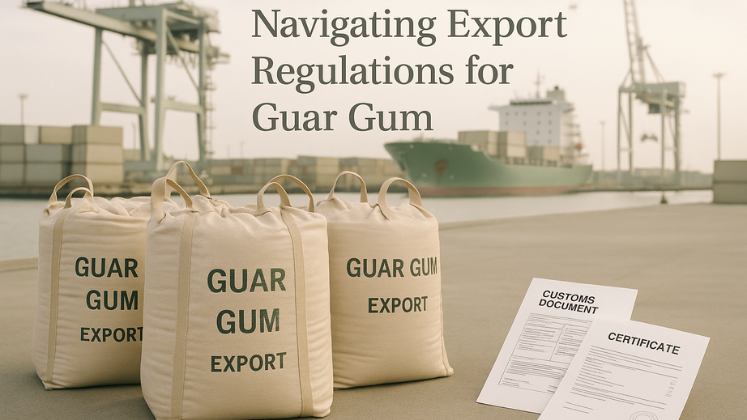Guar gum Exporter involves more than just sourcing a product; it’s a process shaped by documentation, trade rules, and regulatory approvals. Businesses looking to import this adaptable commodity use it across food processing, oil drilling, pharmaceuticals, and personal care. So, all these buyers must navigate a range of compliance checks to ensure smooth delivery.
From required certifications to labelling regulations, each market has its framework. Importers who stay informed and work with experienced partners are better positioned to avoid delays, reduce risk, and meet international standards effectively.
Why Export Compliance Matters in the Guar Gum Trade
Export regulations ensure that buyers receive safe, high-quality, and correctly documented materials. As highlighted by the International Trade Centre (ITC), trade disruptions often occur when exporters or importers fail to comply with country-specific technical and safety standards. Being prepared with proper documentation and regulatory knowledge is essential for success.
Essential Documents Buyers Must Request
If you’re importing guar gum, confirm that your supplier provides the following key documents:
- Certificate of Origin (COO) – Confirms the country where the guar gum was processed.
- Phytosanitary Certificate – Required for natural products to ensure they are pest- and disease-free.
- Batch-wise Test Report or COA – Confirms product specifications and consistency.
- Material Safety Data Sheet (MSDS) – Important for handling, storage, and transportation details.
- ISO / HACCP Certification – Crucial for food-grade or pharmaceutical-grade imports.
These records demonstrate product safety, quality control, and origin legitimacy, ensuring quick customs clearance.
Understanding Country-Specific Requirements
Different countries enforce unique labelling and compliance rules based on the classification of guar gum:
- United States: The FDA requires GRAS status for guar gum used in consumable goods, along with full traceability and proper labeling.
- European Union: Guar gum must meet EFSA food additive regulations and REACH compliance for industrial imports.
- China & ASEAN markets: Local language labels, batch numbers, and country-of-origin declarations are mandatory.
Before proceeding with procurement, importers should contact their local trade authority or customs office to confirm the latest regulations.
The Role of Trusted Exporters in Simplifying Compliance
Choosing a supplier that understands and supports compliance efforts is just as important as product quality. A reliable partner helps you navigate forms, certifications, and customs classifications.
Working with a certified guar gum exporter of Pakistan, such as MFTC Gums, provides assurance that the product is processed, packaged, and documented according to international requirements. From trade licenses to timely documentation, reputable exporters help reduce compliance risks and shipping delays.
Packaging, Labelling, and Traceability Expectations
Improper or incomplete packaging is one of the most common reasons for shipment rejection. Buyers should ensure that the packaging:
- Includes batch numbers and manufacturing dates.
- States net and gross weight clearly.
- List storage and handling instructions.
- Fulfils destination labelling language requirements.
- Protects the product from moisture and contamination during transit.
Flexible exporters often offer custom packaging solutions that align with regulatory and branding expectations.
Proven Steps to Import Guar Gum from Pakistan
For those unfamiliar with the process, here are the practical steps to import guar gum from Pakistan:
- Define usage requirements – Decide if you need food-grade, pharma-grade, or industrial-grade guar gum.
- Choose an experienced exporter – Look for verified exporters with a strong trade history and relevant certifications.
- Confirm all documentation – Request test reports, safety data sheets, and legal trade documents.
- Negotiate in terms – Clarify whether your shipment terms are FOB, CIF, or DDP to manage cost and responsibility.
- Coordinate freight and insurance – Work with freight agents or let your exporter manage logistics end-to-end.
- Clear customs and inspect delivery – Ensure all required paperwork is presented to customs and verify the product upon arrival.
Buyers who follow these steps enjoy smoother shipping, fewer surprises, and better long-term supplier relationships.
Why Partnering With MFTC Gums Makes a Difference
When sourcing internationally, trust is everything. MFTC Gums isn’t just a supplier; it’s a long-standing partner to global buyers seeking guaranteed quality and smooth logistics. As a certified exporter with a deep knowledge of trade regulations, MFTC Gums handles everything from documentation to shipment, ensuring your business stays on track and compliant.
FAQs
1. What certifications are essential when importing guar gum?
A: Importers should request a Certificate of Origin, HACCP/ISO certification, phytosanitary document, and a batch test report from their supplier.
2. How do I know my supplier is export-compliant?
A: Verify that your exporter has experience shipping to your country and provides all documentation. Look for verified certifications and trade references.
3. Are there import restrictions on guar gum?
A: Restrictions vary by country and end-use. Check with local customs for food safety standards, additive classifications, or industrial safety guidelines.
4. What Incoterm is most cost-effective for bulk guar gum orders?
A: CIF (Cost, Insurance, Freight) is often used for convenience, while FOB gives buyers more control over logistics. Choose based on your shipping experience and budget.
5. Can I request specific labeling or private branding for guar gum?
A: Yes. Many exporters, like MFTC Gums, offer flexible labelling and packaging options, especially for resellers and manufacturers with private-label requirements.


Leave a Reply